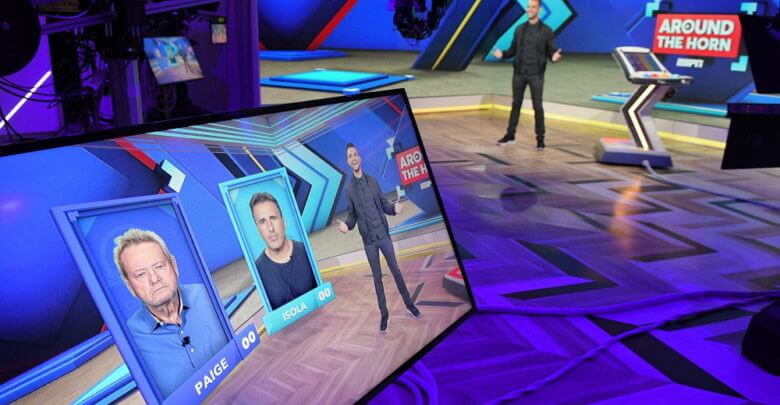World News
“The End of an Era: ESPN Cancels Around the Horn After 23 Years of Sports Debate”
The Rise of Around the Horn – A Pioneering Sports Debate Show
Around the Horn began its journey on ESPN in 2002, a time when the sports debate format was gaining traction across various media platforms. Created by ESPN’s executives, the show was initially envisioned as a more engaging, fast-paced alternative to traditional sports reporting. The premise was simple: four sports journalists, each from a different background, would debate the top stories in sports, with the audience witnessing a lively, sometimes contentious exchange of opinions.
The idea of using sports journalists as panelists was innovative for the time. ESPN tapped into the growing desire for debate-style programming that mixed expert opinions with entertainment. From the beginning, the format was built to encourage strong opinions, witty exchanges, and competitive banter. The show’s unique combination of lively discussions and the quick-paced “points” system—where each panelist earned or lost points based on their performance in the debate—captured the essence of sports fans’ enthusiasm for high-stakes arguments.
Over the years, Around the Horn became a fixture in the sports media landscape. The show’s format was a precursor to the many debate-driven sports shows that followed. It popularized a unique blend of humor, sharp analysis, and rapid-fire opinions that has been replicated by numerous other programs, but none could quite match the original show’s dynamic.
Tony Reali, who began hosting the show in 2004, became synonymous with Around the Horn. His witty and balanced moderating style guided the spirited debates, often injecting humor and levity while ensuring the debates remained focused. Under his leadership, Around the Horn became not just a debate show, but a celebration of the personalities of the panelists, making each episode a unique experience.

The Show’s Impact on Sports Media – Shaping Modern Sports Debate
Around the Horn wasn’t just another sports talk show. It was a trailblazer in how sports news was presented on television. The show’s success helped lay the foundation for other debate-style programs like Pardon the Interruption and First Take, both of which follow similar formats involving sports analysts and personalities arguing over hot topics.
One of the major contributions of Around the Horn to the evolution of sports media was its focus on panelists who weren’t necessarily former athletes or coaches. Instead, it gave a platform to sports writers, columnists, and reporters, providing a fresh and often intellectual perspective on sports stories. This focus on journalistic expertise was different from the typical athlete-centric commentary that dominated much of sports television at the time.
The show’s impact can be seen in how it reshaped sports talk into something more dynamic and accessible. The “debate” became a core part of the sports media diet. Today, many sports networks and platforms have embraced the debate format, but Around the Horn remains one of the first and most significant shows to popularize it. For viewers, the appeal wasn’t just in the analysis of plays or games; it was about how sports were framed in the context of societal, political, and cultural relevance.
In many ways, Around the Horn taught audiences to appreciate the personalities behind the sports commentary. It wasn’t just about facts; it was about the passion, conviction, and sometimes fiery exchanges between panelists. This format became a crucial part of ESPN’s branding, adding another layer of depth to its content offerings.
Tony Reali’s Legacy – The Face of Around the Horn for Two Decades
Tony Reali’s tenure as the host of Around the Horn is a story in itself. Reali joined the show in 2004, after working on ESPN’s Pardon the Interruption as a statistician and research assistant. His transition into the host chair was a game-changer for the show, as he quickly established himself as the face of the program. His calm demeanor, quick wit, and ability to keep panelists on track made him an ideal moderator.
Reali’s impact on the show was undeniable. He became the glue that held the debates together. His ability to balance the various personalities of the panelists, who often brought passionate arguments to the table, was key to the show’s success. In many ways, Around the Horn wasn’t just about the panelists; it was about Reali’s ability to steer the conversation in a way that kept it engaging and entertaining while maintaining a sense of structure.
Beyond his moderating skills, Reali also became a beloved figure in sports media. His personable, everyman approach made him relatable to audiences. His brand of humor and ability to roll with the punches also endeared him to the show’s guests and panelists. For many viewers, Reali was synonymous with the show, and his departure will mark the end of an era for Around the Horn.
As Around the Horn becomes part of sports media history, Reali’s contributions will be remembered as a key part of the show’s success. His influence will continue to be felt in how debate-driven sports shows are structured moving forward.

ESPN’s Evolving Strategy – Why Around the Horn Had to End
The cancellation of Around the Horn comes amid broader changes at ESPN, a company that has faced its own challenges in an increasingly competitive sports media landscape. Over the past decade, ESPN has seen a shift away from traditional cable television toward streaming services. With the rise of digital platforms and new competitors, ESPN has had to adapt its content strategy, moving toward more specialized, on-demand programming.
ESPN’s decision to cancel Around the Horn is also tied to the network’s re-evaluation of its offerings. As part of a broader strategy, ESPN has been scaling back certain programming and focusing on content that better aligns with current trends in media consumption. The move to replace Around the Horn with a 30-minute version of SportsCenter reflects the network’s ongoing pivot to shorter, more digestible news formats that cater to the demands of today’s viewers.
This shift in programming also speaks to a larger trend within sports media: the rise of on-demand streaming. As more viewers turn to platforms like ESPN+, YouTube, and other streaming services to watch sports, ESPN is likely looking to cater to these preferences by focusing on content that works better in a digital-first world. Shorter, more flexible formats allow for greater reach across multiple platforms, something Around the Horn—with its longer, debate-focused episodes—did not always achieve.
In some ways, the cancellation of Around the Horn signals the end of an era for ESPN’s traditional content. While the debate show was a key part of its identity for over two decades, the company’s future lies in innovation and adaptation to the changing media landscape. The end of Around the Horn reflects ESPN’s ongoing efforts to stay relevant in an era where digital consumption reigns supreme.
The Future of Sports Debate – What Comes Next for ESPN?
As Around the Horn draws to a close, the big question is: What comes next for sports debate on ESPN? While the show may be ending, the concept of sports debate is far from over. ESPN has a rich history of content that blends analysis, discussion, and entertainment, and it is likely that the network will continue to produce content in this vein. The challenge, however, will be adapting the debate format for a new generation of viewers who prefer shorter, more interactive content.
It’s likely that ESPN will continue to explore new formats that merge traditional debate with the fast-paced, engaging qualities that have become hallmarks of modern sports commentary. Digital-first programming, such as live-streamed debates, fan interaction, and real-time analysis, could be the future of sports discourse on the network.
Furthermore, the integration of newer technologies, such as AI-driven commentary, virtual sports analysis, and even fan-driven content, could also play a role in the next generation of sports talk. While traditional shows like Around the Horn may be fading, the hunger for sports debate remains strong. As ESPN continues to evolve, the question is not whether debate shows will survive, but how they will adapt to an increasingly fragmented and digital audience.
The cancellation of Around the Horn does not mark the death of sports debate in the mainstream media. Instead, it represents a shift toward a more interactive, tech-driven future. As ESPN continues to innovate, it will undoubtedly find new ways to keep audiences engaged with the spirited and entertaining discussions that have become a staple of sports media.
Conclusion
The cancellation of Around the Horn after 23 years marks the end of an era for ESPN and sports debate television. However, its legacy will endure, influencing a new generation of sports talk shows and debate formats. The show’s impact on sports media cannot be overstated, from its innovative approach to panel discussions to its role in popularizing sports debate culture. As ESPN looks to the future, it must navigate the changing landscape of sports media, but one thing is clear: Around the Horn will always be remembered as a groundbreaking part of ESPN’s history.
From dragontrendtees


